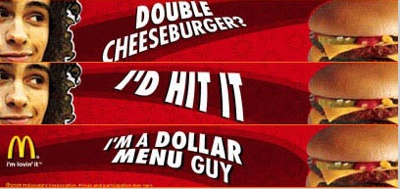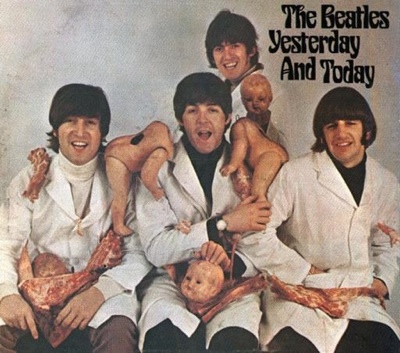 Miscellaneous
Miscellaneous  Miscellaneous
Miscellaneous  Gaming
Gaming 10 Funny Tutorials in Games
 History
History 10 Fascinating Little-Known Events in Mexican History
 Facts
Facts 10 Things You May Not Know about the Statue of Liberty
 Movies and TV
Movies and TV 10 Movie Adaptions That Brought Popular Songs to Life
 Health
Health 10 Miraculous Advances Toward Curing Incurable Diseases
 Miscellaneous
Miscellaneous 10 Undeniable Signs That People’s Views of Mushrooms Are Changing
 Animals
Animals 10 Strange Attempts to Smuggle Animals
 Travel
Travel 10 Natural Rock Formations That Will Make You Do a Double Take
 Movies and TV
Movies and TV 10 Actors Hidden in Your Favorite Movies
 Miscellaneous
Miscellaneous 10 Interesting Things Manufacturers Stopped Making and Why
 Gaming
Gaming 10 Funny Tutorials in Games
 History
History 10 Fascinating Little-Known Events in Mexican History
Who's Behind Listverse?

Jamie Frater
Head Editor
Jamie founded Listverse due to an insatiable desire to share fascinating, obscure, and bizarre facts. He has been a guest speaker on numerous national radio and television stations and is a five time published author.
More About Us Facts
Facts 10 Things You May Not Know about the Statue of Liberty
 Movies and TV
Movies and TV 10 Movie Adaptions That Brought Popular Songs to Life
 Health
Health 10 Miraculous Advances Toward Curing Incurable Diseases
 Miscellaneous
Miscellaneous 10 Undeniable Signs That People’s Views of Mushrooms Are Changing
 Animals
Animals 10 Strange Attempts to Smuggle Animals
 Travel
Travel 10 Natural Rock Formations That Will Make You Do a Double Take
 Movies and TV
Movies and TV 10 Actors Hidden in Your Favorite Movies
Top 10 Worst Marketing Gaffes Ever
Advertising is a part of life whether we like it or not. It is on TV, in Movies, on the Internet, on Buses and practically anywhere it can be seen by prospective customers. Sometimes ads are funny, sometimes they are poignant, but mostly they are annoying. And sometimes, ads are downright stupid. This list looks at 10 marketing gaffes, and blunders, or just downright bad commercials.
This advert by McDonald’s – which was meant to “adultify” the fast-food joint used Mack the Knife as its theme. Mack the Knife (the character) comes from The Beggar’s Opera in which the he typifies the anti-establishment sentiments of its writer John Gay. The more famous song as we know it was written by Kurt Weill for The Three Penny Opera based on a reworking of the tale by Bertolt Brecht – a Marxist who, ironically for McDonald’s, despised capitalism – the very thing which enabled McDonald’s to become what it is today.
McDonald’s isn’t the only company to make marketing gaffs – in December 2008, Burger King purchased the rights to an advertising campaign that centered on a taste-test marketing campaign, dubbed “Whopper Virgins.” The test claimed to target participants who were unaware of the existence of Burger King or McDonald’s, and had never eaten a hamburger. Opponents of the campaign called it exploitative and racist. As one would expect from a campaign such as this, Burger King was chosen as the favorite by all of the “poor foreigners” involved.
Skittles are wonderful colorful candies that everyone loves to eat. In fact, they are awesome. Not so this ad. For some reason it was deemed a good idea to make an ad which parodies the suffering caused by disease. Yes – it appears amusing, but after watching this, the thing I want is a razor blade, not a packet of skittles.
Frankly, I don’t find the idea of a creature which looks like a cross between a rat and a coughed up hairball to be an appealing mascot for a fast food store. And I am not alone in this. When Quizno’s released this series of ads (basing them on a popular Internet Meme at the time), there was such a backlash from consumers that they had to pull them – fast. Poor Quiznos also caused controversy with this ad for its sexual innuendo.
In the fast paced world of computer software, every opportunity to advertise is significant. Such was the case in the press conference above in which Microsoft had Bill Gates demonstrate Windows 98 to the entire world. Unfortunately for Bill, in the middle of the demo, Windows crashed and showed the dreaded Blue Screen of Death. There is a very uncomfortable pause while both of the men on stage try to think of something witty to get passed it.
Poor Gary Coleman has had some bad luck in his life. Despite the illness which rendered him short for life, he became one of the most popular child actors on Different Strokes in the 1980s. At the peak of the show he was earning $100,000 per episode – but his parents, lawyers, and the taxman stole the majority of it leaving him penniless. But then, during 2006 and 2007, he appeared in commercials for a cash-advance loan company called CashCall. He ends the commercial by saying, “Pay your bills on time and everyone will love you.” He even remarks in one commercial that “no one would lend [him] money, not even [his] relatives.” and “What’choo talkin’ ’bout CashCall?” in another. Demeaning.
When McDonald’s came up with this marketing campaign, their ad executives didn’t know what the phrase “I’d hit it” meant. They simply heard kids using the jargon and decided it would be their next big slogan. Unfortunately for McDonald’s, it means (according to Urban Dictionary): “I’ll have sex with her but I’ll be damned if I respect her.” Even worse, the full phrase of the slogan was “Double Cheeseburger? I’d hit it. I’m a Dollar Menu guy.” Nice.
This one has featured on listverse before, but it is simply too bad not to include. Obviously when it was first released the AIDS virus was not known, but it is definitely one of the most cringeworthy ads in history. Not only is it named after one of the worst diseases in humans at the present time, it advocates diet pills for weightless rather than exercise and portion control. “Lose weight deliciously with the aid of Ayds!”
Album covers have long been used as advertising gimmicks – to attract buyers by the often unrelated artwork. Unfortunately for the Beatles, the 1966 US release of their album “Yesterday and Today” featured the above album cover. Upon release, reaction was immediate, and Capitol received a storm of complaints from dealers. The record was immediately recalled and all copies were ordered shipped back to the record label, leading to its collectibility. Despite all of the controversy, the album reached number one in the United States.
This one is on the list for its sheer awfulness – for the company it may be a success – for every person that has to suffer it – it is an abomination. The smiley central ads usually make annoying noises and the worst thing about it is that if you do click the ad and install their smileys – it installs spyware which tracks your web habits for advertising purposes. [JFrater: These awful things even appeared on listverse causing hours of wasted time being spent tracking down the host advertiser to have it blocked. Smiley central is evil.] Smiley Central is owned by Ask.com – previously AskJeeves.
Hire a social media agency to reach the website audience you want with relevant targeted ads.











